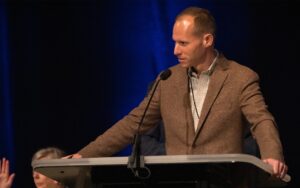
EDITORS’ NOTE: The following is excerpted from a new book by Paul Pressler, “A Hill on Which to Die: One Southern Baptist’s Journey.” Pressler, a retired Texas appellate court judge, recounts in the book his experiences as one of the architects of the Southern Baptist Convention’s conservative resurgence.
HOUSTON (BP)–Many people complained that the conservative movement was disruptive for Southern Baptists. Regrettably, to a certain extent, that was true. However, the moral and theological issues have been resolved for us as a denomination, and probably we shall see only a small split because of it. If we had failed to deal with the issues, far greater disruption would have occurred, with a larger split. Because other U.S. denominations failed to control the liberal invasions of their denominations in its earlier stages, their conflict and disruption will be great, with far greater detrimental effects to the cause of our Lord Jesus Christ.
Grave problems still confront Southern Baptists, however. One is the bureaucracy of the convention. I once wondered how local, independent, Bible-believing churches in the first century developed into the Roman Catholic Church. After observing the manner in which the bureaucracy grew in the Southern Baptist Convention in a very short time, I no longer wonder. The main danger of a bureaucracy is that it becomes an end in itself and not a means to effectuate the principles for which it was founded. History shows us that a bureaucracy, whether political, religious, or business, ends up seeking additional perks for itself and additional favors for those in the bureaucracy. It becomes loaded with individuals whose only qualification is that they have been loyal to the system and, therefore, are rewarded by being placed in the bureaucracy when they fail elsewhere.
The “good ol’ boy” system evidently started years ago. Liberals developed under this system, because the liberals were careful not to voice their extreme positions publicly (with a few exceptions) and were careful to pay their dues to the system. Such a system must not be allowed to develop under conservative leadership. We must always seek the very best individuals to lead and to serve in our agencies. We must guard against a reinstallation of a “good ol’ boy” system under which anything could occur as long as it didn’t harm the bureaucracy.
I fear bureaucratic control and domination. I had nothing to do with the restructuring proposal which the SBC adopted at the 1995 annual meeting in Atlanta. In fact, I learned about it only when it was being announced to the convention as a whole. However, I am very enthusiastic about it, because I think it is a realistic attempt to reduce the bureaucracy and to minimize what could have a stifling effect on the presentation of the gospel.
Another great danger to the convention’s future is that some people who now might dominate in convention leadership were unwilling to pay the price to lead the convention to be restored to its conservative principles when it was risky to do so. These might seek to lead out of a desire for prominence, personal perks, and privileges, rather than because they are willing to give of themselves so that the original biblical convictions of Southern Baptists might be maintained.
I have heard people say (and others have reported such remarks to me) that certain individuals should be disqualified from service and leadership because they have too many bruises from having fought in the battle. When a person is disqualified for service because that person gave unreservedly to win the victory, we have reached a point of self-destruction. Those who have paid the price should not be excluded because they were willing to sacrifice themselves.
In any great movement are individuals who sit back and watch to see which way the battle will go. When they see which side will prevail, they attach themselves to that side. These people disturb me, because they seem to be self-serving individuals who are more interested in their own advancement than they are in basic principles. They are more concerned with their own future than they are with the cause itself. The possibility of their ascending to leadership worries me. If they attach themselves to the biblical cause because they perceived it would win, they could at another time sell out the principles which they have come to espouse because they see another “winning” cause. Some people have said that a good leader is one who finds out the direction the people are going and then gets in front of the movement. To me, that is not the mark of a good leader; it is the mark of a poor leader. This type of person leads in order to advance himself or herself and does not lead in order to advance principles. Any movement, particularly a religious one, is in danger when such people attach themselves to the cause.
Those who were unwilling to risk certainly have a place in the convention leadership, but they should not be dominant and certainly should not lead to the exclusion of those who have paid the price and have stood in a principled manner the entire time. Leadership should emerge from people who are principled, who adhere to sound doctrine, who are more committed to the cause than to their own personal advancement, and who are willing to follow the Holy Spirit’s leading in promoting sound doctrine regardless of the personal cost. The permanency of the movement will be determined by whether principled leadership continues or whether self-serving individuals take over and build a stifling bureaucracy.
We find that people whom we thought were on the other side are now loudly proclaiming that they were “with us all the time.”
The Southern Baptist Convention will continue. It will continue its growth; it will continue its strength; and it will continue winning people to Jesus Christ. Whether it continues in as vibrant a manner as it should will be determined by how dedicated to principle and not to self-promotion the future leaders will be. I pray that God will give us principled leadership.
In an outstanding address to an Executive Committee meeting in Nashville on Feb 17, 1997, SBC President Tom Elliff summarized his concerns for Southern Baptists. He stated our needs as follows:
1. “A need to certify his or her experience with Christ.”
2. The “stranglehold of debt” that is “preoccupying us.”
3. The need “to crucify our egos.”
These are all grave concerns. Theology is never an end in itself. It is a means to a vital relationship with our Lord Jesus Christ. As we believe and know His Word, we grow closer to Him and develop as believers. The theological issue has been addressed. Now we must see the effects that the victory brings in producing godly lives which glorify the Lord and will attract others to our Savior. If we fail here, all will have been in vain.
The debt issue can be a spiritual issue also. Do we ever overbuild our churches so that a pastor or congregation can boast about what was built? Poor business practices by believers keep others from trusting our Lord. How can we preach sacrifice and give a pittance to our great mission programs because we have so overloaded ourselves with debt?
Perhaps the focus on the egos of Christians highlights the most devastating problem which few have found the courage to address. Believers should die to self. However, sometimes it seems that the need by some for self-promotion motivates rather than a brokenness over the fate of those who are eternally lost. A true Christian leader is best seen when he or she is hidden behind the cross. No one who really wants to be president should ever be elected president of the Southern Baptist Convention. It is a God-given responsibility of service, not an ego trip for recognition. We are all merely sinners saved by grace. If we constantly fail to recognize this, we are doomed to fail as a people. God has called us to be servants, not self-promoters. We need servant leadership for the Southern Baptist Convention.
The battle is over, but we will feel the effects and ramifications of it for many years. How effective it will be on a long-term basis will be determined by whether we follow principled individuals who are willing to risk all and charge a hill on which they are willing to die. Our leaders must be servants of God, not servants of their own ambitions.
Being a layperson, I return to my original pursuits and plan to enjoy my retirement. Those who are called of God to be leaders in the denomination, whether in the pastorate, in our institutions, or as lay leaders, will lead. I shall watch them and pray for them.
The future for Southern Baptists is bright. I praise God for what He has done to bring change in the convention. This could never have originated from individuals. The odds were too great. The victory had to be of God.
The citadel of liberalism was charged and the hill on which to die was captured, but not without great cost. God has given the victory in an amazing way. I praise Him for it. I pray that His people will preserve this victory to His glory until He comes again.














